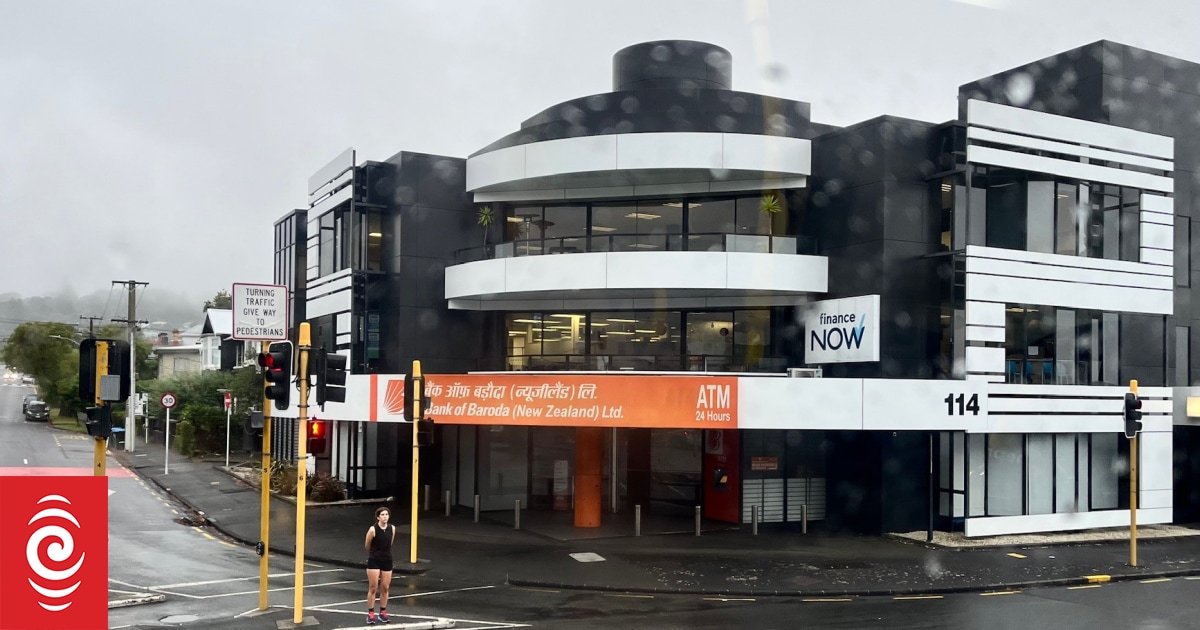A Bank of Baroda branch on Auckland’s Dominion Rd.
Photo: RNZ
India’s second-largest public bank has dropped plans to sell its New Zealand business on the back of free trade negotiations between the two nations.
Bank of Baroda had invited investment banks to assist with the sale of its New Zealand arm in December 2021 but later withdrew the proposal.
The plan was revived in December 2023, with bids due in January 2024 before being abandoned mid-year.
“The decision [to sell the bank’s New Zealand subsidiary] changed in June,” said Sandeep Khetan, managing director of Bank of Baroda New Zealand.
In May, India and New Zealand kickstarted trade negotiations after Prime Minister Christopher Luxon took one of the country’s largest ever prime ministerial delegations to India in March.
“The ongoing FTA negotiations were definitely one of the factors of reconsideration,” Khetan said.
“It was decided by our parent bank to continue the New Zealand operations, and we have conveyed our decision to our local regulator, the Reserve Bank of New Zealand.”
The U-turn on the sale followed a May visit from the bank’s global and international operations team.
“A decision was made to continue operations since India and New Zealand are in the process of an FTA, and the bank is exploring the option to make use of the opportunity,” he said.
Sandeep Khetan is managing director of Bank of Baroda New Zealand.
Photo: Supplied
India and New Zealand concluded the second round of free trade talks in New Delhi on 25 July, with progress reported in goods, services, investment and trade facilitation, according to India’s Commerce Ministry.
Both sides aimed to conclude a “balanced, comprehensive and forward-looking” deal, the ministry said in a statement.
A third round of negotiations was scheduled to be held in New Zealand this month.
Luxon recently told RNZ his government was committed to sealing the deal in its current term.
“Our trade ministers are working really hard,” Luxon said during Indian independence celebrations in Auckland last month.
“They continue to have rounds of negotiation and we’re very, very hopeful we will get something done, and, if we can do it quicker, we will.
Prior trade negotiations, which took place between 2011 and 2015, were hindered by obstacles, particularly around New Zealand’s dairy exports.
Talks ended after India joined the Regional Comprehensive Economic Partnership, which the South Asian nation exited in 2019.
Khetan highlighted the bank’s global standing as part of its decision to remain.
“Bank of Baroda is the second-largest public sector bank in India, with more than 9000 branches in India and operations in 17 countries,” he said.
“It was the view of the bank that it should continue its business in New Zealand rather than closing.”
Prime Minister Christopher Luxon shares a laugh with Indian Prime Minister Narendra Modi in New Delhi in March.
Photo: Supplied
Bank of Baroda was the first Indian bank to establish itself in New Zealand, incorporating in 2008.
Its first branch opened in Mt Eden, Auckland, in June 2010, followed by another in Wellington.
Khetan said the bank was now looking to expand, although not immediately.
“We’re planning to launch new products, and we are open to opening new branches as well,” he said. “We’re coming up with a new product for small businesses in New Zealand.”
He said the bank also planned to move into trade finance with an FTA in sight, highlighting its appeal to the local Indian community.
Rahul Chopra, a Bank of Baroda customer in New Zealand for 12 years, welcomed the decision.
“With increasing trade, commerce and people-to-people connections between New Zealand and India, Bank of Baroda will continue to play a vital role in facilitating economic growth for both countries,” he said.
Khetan said that Bank of Baroda New Zealand operated in a subsidiary model and all liabilities were guaranteed by the parent bank in India.
“We are continuing in New Zealand and there are more new things coming,” he said.

